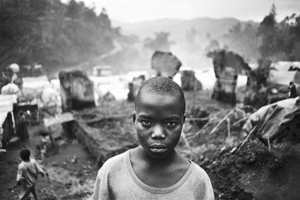While the legacies of the Holocaust during the Second World War, or the 1994 Rwanda genocide remain pervasive within the collected memory of the international community, there are many humanitarian crises equally tragic which have to date remained overshadowed. The world may be focused on the current conflicts in Ukraine or Syria, yet the ongoing civil war in the Democratic Republic of Congo (DRC), which has been the deadliest and most prolonged conflict since the Second World War, has been largely ignored.
The DRC has been in conflict for nearly two decades. The country was in a civil war from the mid 1990s to 2003, and officially transitioned to peace and democracy in 2006. Despite peacekeeping efforts and a strong international presence, the country remains in political turmoil to this day, especially within its eastern region.

The DRC is extremely rich in mineral resources, including gold, diamond, coltan and copper. If such resources were utilized properly in a politically stable environment, the DRC could be one of the richest countries on the world. However, the realities of its political upheavals have created one of the world’s deadliest conflicts, with a death toll of over 5.4 million people.
The DRC holds a poor human rights record, with its government conducting countless crimes against humanity. The country is also heavily criticized for its treatment of women having been referred to as the “rape capital of the world.” According to the American Journal of Public Health 1,152 women in the DRC, are raped every day. That is the equivalent to 48 cases of sexual assault being conducted every hour. Rape is a weapon of war in this country, it is used by the military to weaken any form of opposition.
Justine Masika Bihamba, a native of the DRC, was first raped at the age of 15 and has now founded a rescue centre for rape victims. She explained that men are sometimes kidnapped at a very young age and their lack of a safe upbringing and often brutal surroundings reinforces the cycle of violence. Today there are approximately 7,000 child soldiers in the DRC, some as young as nine years old who face few opportunities and are being abducted or lured into a life of brutality.
Multinational corporations are contributing both directly and indirectly to this conflict. Multinational corporations fund military operations, creating a network of key political, military and business elites who exploit the country’s mineral resources.
The violence in the DRC has been largely ignored by the media, with the international community remaining by the sidelines. In 2002, a UN panel accused 85 companies of breaching OECD standards, by conducting massive human rights violations including torture, rape and murder to exploit the country’s wealth after the war began in 1998. Many governments have since put pressure on the Security Council to have their companies removed from the report. Multinational corporations, including Canadian mining giants operating in the DRC are funding military operations in exchange for lucrative contracts. Canadian mining investment in the region is estimated at approximately $3 billion.
With the crisis in Ukraine, reaching nearly 4,000 deaths, and the conflict in Syria resulting in over 200,000 casualties, international attention has been largely absent from the violence and brutality which has plagued the DRC for the past few decades, in spite of the much higher number, over 5.4 million of lives lost.




